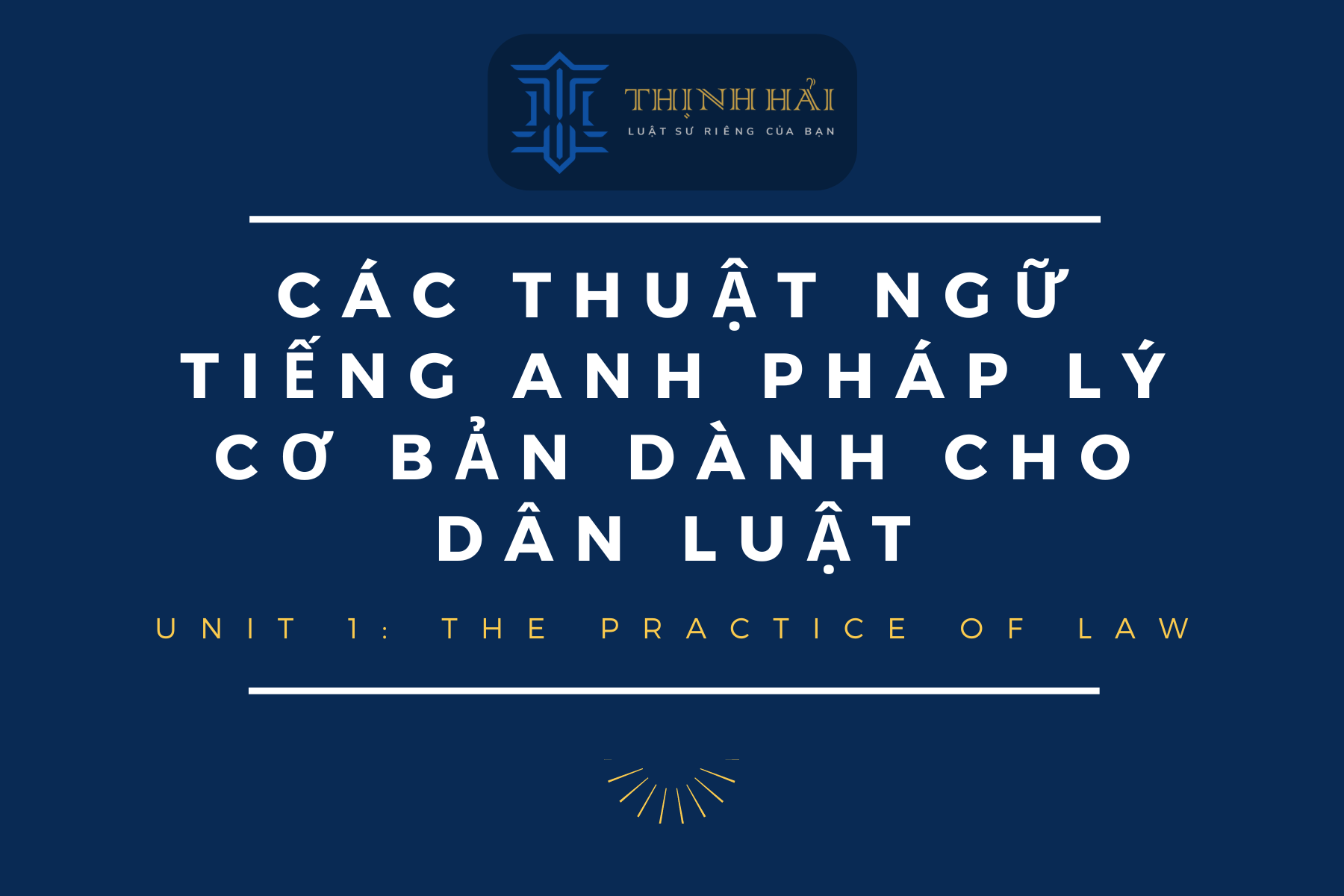UNIT 1: THE PRACTICE OF LAW
1. Civil law: legal system developed from Roman codified law, established by a state for its regulation; area of the law concerned with non-criminal matters, rights and remedies.
2. Common law: legal system which is the foundation of the legal systems of most of the English- speaking countries of the world, based on customs, usage and court decisions (also case law, judge-made law)
3. Criminal law (= penal law): area of the law which deals with crimes and their punishments, including fines and/or imprisonment
4. Codify (v): to arrange sth such as laws or rules into a formal system for people to follow (codify st into sth)
5. Precedent (tiền lệ) (n): an action, situation, or decision that has already happened and can be used as a reason why a similar action or decision should be performed or made ( +for).
è Set/ establish a precedent
6. Adversary procedure ( adversarial system): involving two people or two sides who oppose each other. Meanwhile, the judge plays a role as a passive arbitrator.
7. Inquisitorial systems (hệ thống thẩm tra): The presiding judge is primarily responsible for supervising the gathering of the evidence necessary to resolve the case. He actively steers the search for evidence and questions the witnesses, including respondent or defendant è Seeking the truth by questioning those most familiar with the events in dispute
8. Adversarial systems (hệ thống đối nghịch): Two or more opposing parties gather evidence and present it, and their arguments to a judge or jury. The judge knows nothing of the litigation until the parties present their cases to the decision-maker è Seeking the truth by pitting the parties against each other in the hop that competition will reveal it (put a premium on the individual rights of the accused)
9. Testimony (lời khai) (n): a formal statement about something, especially one given in a court of law.
⇒ Give/ present/ provide/ recant (withdraw) testimony
⇒ Be (a) testimony to sth: to be clear proof of sth.
10. Regulation (n): rules issued by a government agency to carry out the intent of the law; authorized by a statute, and generally providing more detail on a subject than the statute.
11. Ordinance (sắc lệnh) = By- law: law enacted by a town, city or county government.
12. Bill (luật dự thảo) (n): draft document before it is made into law
13. Directive (n): legal device used by the European Union to establish policies at the European level to be incorporated into the laws of the Member States.
14. Statute (Đạo luật) (n): Formal written law enacted by a legislative body. (Cao nhất)
15. Appellate court (court of appeals, appeals court): this is where a case is reviewed which has already been heard in a lower court.
16. Crown court (tòa đại hình): This is where serious criminal cases are heard by a judge and a jury in the UK
17. High court (supreme court): This is usually the highest court in a jurisdiction, the court of last resort.
18. Juvenile court: This is where a person under the age of 18 would be tried.
19. Lower court ( a court of first instance)
20. Magistrates‘ court: This is where small crimes are tried in the UK.
21. Moot court: This is where law students argue hypothetical cases
22. Small-claims court: This is where cases involving a limited amount of money are handled (bồi thường thiệt hại ở xã phường)
23. Tribunal: This is where a group of specially chosen people examine legal problems of a particular type, such as employment disputes.
Ex: Arbitral tribunal: Tòa trọng tài.
24. Reasonably prudent person (người giả định): hypothetical person who uses good judgment or common sense in handling practical matters; such a person’s actions are the guide in determining whether an individual’s actions were reasonable. (đặt tình huống rồi giải quyết)
25. Bailiff (n) (thừa pháp lại): officer of the court whose duties include keeping order and assisting the judge and jurors. (= chấp hành viên)
26. Clerk (n): employee who takes records, files papers and issues processes.
27. Advocate (n): person who pleads cases in court
28. Appellant = petitioner (n): person who appeals a decision to a higher court.
29. Affidavit (bản tuyên thệ) (n): a written statement that sb makes after they have sworn officially to tell the truth, which might be used as proof in court.
30. Injunction (n): an official order from a court for a person to stop doing something
--------------------------------------



